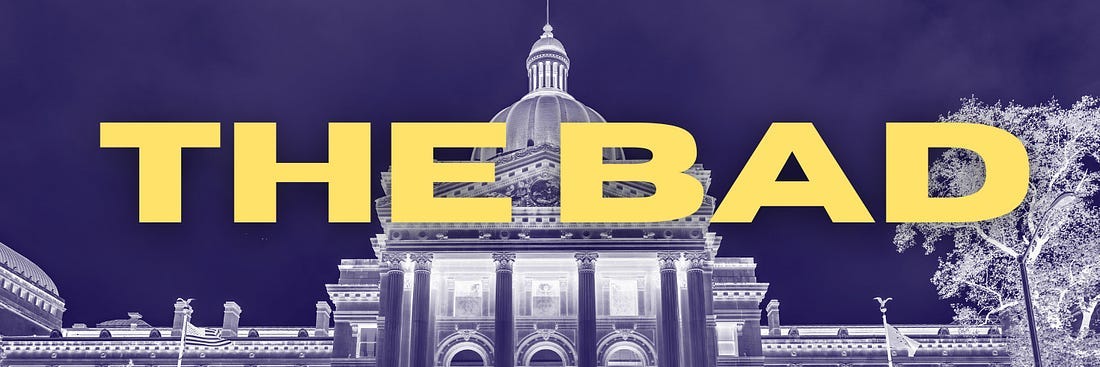2025 Session Wrap-Up: The Good, The Bad and The Ugly
Dear neighbor,
This year’s session lasted from the beginning of January to the end of April. Every two years, during the long session, we build the state budget and tackle large legislation. The General Assembly passes hundreds of bills each year. I’ve discussed some of these bills, but I wanted to provide an in-depth post-session update. Here’s a breakdown of some good, bad and ugly pieces of legislation.
SEA 74: Extension of Lifeline Law Immunity
SEA 74 extends Indiana’s Lifeline Law, providing immunity for underage individuals involved in an alcohol-related medical crisis. Current law protects the caller asking for help due to underage drinking, but not the individual in need of medical attention. Now, the person who needs medical attention is protected as well. This ensures that college students who need help aren’t afraid to call the proper authorities.
SEA 142 reforms state policy for filing evictions and sealing eviction records. This bill requires courts to order an expungement in cases that qualify and allows that action to be taken without a full hearing. In many cases, prior evictions stay on someone’s record and can be used by landlords to deny housing applications, even if the case has been resolved. Without this bill, the eviction expungement process can require large amounts of time and resources.
SEA 146 requires school corporations to increase the mandatory minimum salary for Indiana teachers from $40,000 to $45,000 per year. House Democrats would have liked to see the minimum salary increase to $60,000, but any increase in teacher pay is a positive step forward.
SEA 151: Statute of limitations
SEA 151 extends Indiana’s statute of limitations for rape if new evidence is presented. The statute of limitations extends to 10 years if a recording or a confession is discovered. In current law, the statute of limitations is five years. This legal change will help survivors of violence get the justice they deserve.
HEA 1065: Cancer Clinical Trial Program
HEA 1065 establishes the Cancer Clinical Trial Participation Program to help Indiana cancer patients cover the cost of participating in experimental cancer treatments. Program funds can be used to assist with the costs incurred by a patient in a cancer trial including travel, lodging, parking and other costs.
HEA 1253 streamlines licensing for child care providers with multiple locations by allowing the owner to operate all their facilities under one license. It also allows in-home child care centers to continue operation as class 2 structures as long as they’re licensed in that category before July 2025. Schools with child care facilities can now enroll children whose parents are not students or employed by the school. By streamlining licensing, I hope the availability of child care increases in Indiana.
HEA 1167: Exceptions to Paraphernalia Statutes
HEA 1167 makes it legal to possess and use test strips and kits that can detect fentanyl, xylazine or other deadly substances. This is a life-saving change for those who are battling substance use disorder.
HEA 1416: Awareness of Human Trafficking
HEA 1416, authored by my colleague Rep. John Bartlett (D-Indianapolis), requires safety rest areas, gas stations and welcome centers to display human trafficking awareness information. This helps educate the public on how to spot potential victims of trafficking and what steps they can take to help them.
You can find more information on the bills House Democrats passed here.
The 2026-2027 state budget fails to support everyday Hoosiers. Public schools will get less money per student than previously expected. In many cases, the funding "increases" are so small that they fail to keep up with rising inflation. The budget also broadens the private school voucher program, making it eligible to all families, regardless of income. This means Indiana’s richest families can send their children to private school with taxpayers’ dollars. The budget cuts public health funding by 64%, cuts housing assistance, eliminates Dolly Parton’s Imagination Library and cuts funding for PBS and NPR. In a last-minute addition, Republicans added language to the budget, giving the governor complete control of the Indiana University Board of Trustees. A few positives are in the budget, like additional oversight for the Secretary of State and a cut for the Indiana Economic Development Corporation (IEDC).
SB 423: Small Modular Nuclear Reactor (SMR) Pilot Program
SEA 423 creates a pilot program for small modular nuclear reactors, which allows utility companies to partner with corporations. SMRs are largely untested technologies that aren’t in place in the U.S. This bill allows utilities to recover “project development costs” from their ratepayers, even if the SMR project is never completed. Utilities and corporations—not consumers—should be on the hook for these risky projects. House Democrats proposed multiple amendments that would have prevented utilities from passing off costs to consumers, lowered the cost of utilities and ended reconnection fees. The majority voted down all of our utility amendments.
HEA 1079 modifies property management regulations concerning tenant belongings. The bill reduces the amount of time a warehouse or storage facility may sell a tenant’s property from 90 days to 45 days after a tenant receives a notice to claim their property. Indiana is one of the worst states in the nation when it comes to tenants’ rights, and this policy is another step in the wrong direction.
HEA 1122: Unlawful Encroachment
HEA 1122 provides that a person who knowingly or intentionally approaches within 25 feet of a law enforcement officer after being ordered to stop approaching commits unlawful encroachment on a law enforcement officer, a Class C misdemeanor. Police misconduct and brutality is often brought to light by bystanders witnessing or filming the incident. Making it illegal to come within 25 feet of a law enforcement officers protects bad actors and stifles public accountability.
SEA 1: Local Government Finance
SEA 1 is the GOP proposal to reform property taxes, and it fell short of delivering meaningful tax relief for Hoosiers. The law provides homeowners with a 10% credit (up to $300). Seniors will save an additional $150. However, the tax burden will shift from property taxes to local income taxes, harming working families and renters. Local governments, including our schools, police, fire and EMS, will be defunded by $1.4 billion. Schools will lose over $744 million. Homeowners will have the savings they receive zeroed out with local income tax increases—a potential increase of $1.1 billion per year. SEA 1 also contains controversial language requiring certain public schools to share property tax revenue with charter schools. Republicans rushed this bill through the legislature. This bill was so rushed, Republicans passed a second bill cleaning up their mistakes, House Enrolled Act 1427.
SEA 2 creates more costly red tape for Hoosiers to access health insurance. This bill is focused on slashing participation in the Medicaid program by imposing work requirements for the Healthy Indiana Program (HIP) and strict, quarterly eligibility checks. With permission from the federal government, Indiana will convert the Healthy Indiana Plan (HIP 2.0) into “HIP 3.0.” This bill also allows Indiana to end the HIP program if the federal government revokes or changes the plan or if federal matching dollars drop below 90%. SEA 2 prohibits advertising and marketing for Medicaid and its programs, leaving Hoosiers in the dark about potentially life-saving health care services.
SEA 10 changes the requirements of what is needed so that college students cannot use their official government-issued university student identification to vote. Many college students live, work, spend money, pay taxes and participate in the community of their college towns. They deserve the right to have a say on the officials who pass policies that impact their everyday lives. As one of the lowest voter-turnout states in the nation, we should be trying to break down barriers to the ballot box, not put more in place.
SEA 289: Unlawful Discrimination
SEA 289 is an anti-DEI bill that bans "discrimination" in state institutions and public employment. Labeling DEI initiatives as discriminatory flies in the face of what these programs were designed for. DEI exists to protect at-risk communities from being overlooked and underrepresented. This bill will hurt Indiana students and employees from all backgrounds, but will disproportionately affect our minority communities. Sadly, this bill passed, perpetuating the harmful idea that minority Hoosiers only get jobs or scholarships due to DEI initiatives.
SEA 287 requires school board election candidates to file as a member of a political party. School board candidates will be listed as Republican, Democrat, Independent or with a blank space next to their name. This idea was pushed as an effort to provide transparency to voters. In reality, this bill will invite more politics and division into our schools. Voters could make their decision based on party affiliation instead of researching the candidate’s background and suitability. It also eliminates healthy competition. More urban areas, like Indianapolis and Fort Wayne, will have school boards dominated by Democrats, while rural school boards will be Republican. Our school board’s priority should be our children, not a political party.
HEA 1002: Various Education Matters
HEA 1002, the 139-page GOP proposal to “deregulate” state education laws eliminates the requirement for the state Secretary of Education to have an advanced degree, education experience or reside in Indiana. The bill also eliminates requirements for high schools to offer an ethics course in an effort to comply with federal guidance to remove diversity, equity and inclusion from public education. Democrats were successful in amending the bill to keep training requirements for teachers on trauma-informed practices and provide students with information about the 988-suicide hotline, but the Republican author removed teacher training requirements related to cultural competency and social emotional learning from the final version of the bill.
If you have any questions about legislation, you can visit iga.in.gov. Please reach out to my office at h94@iga.in.gov with any comments, thoughts or concerns. I hope you will continue to be engaged this summer.






